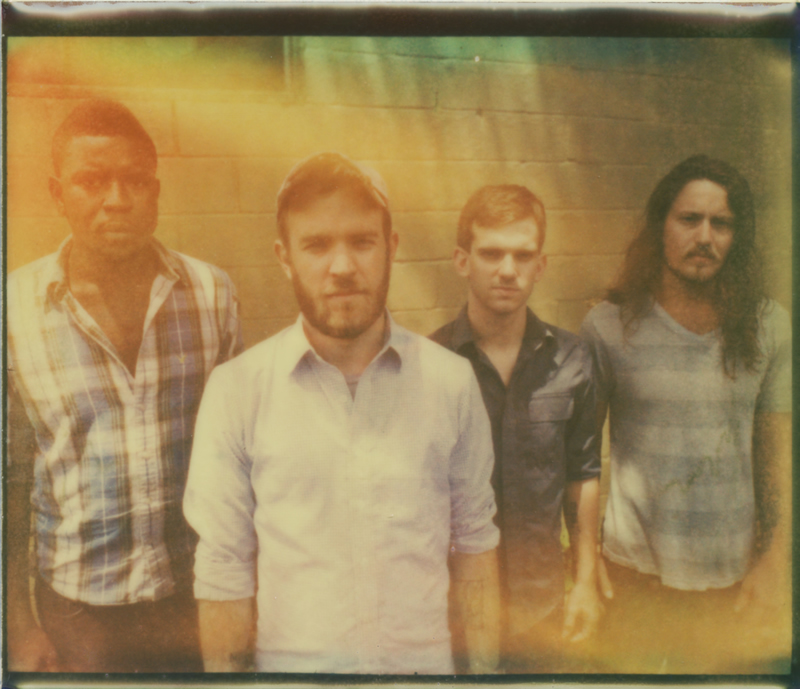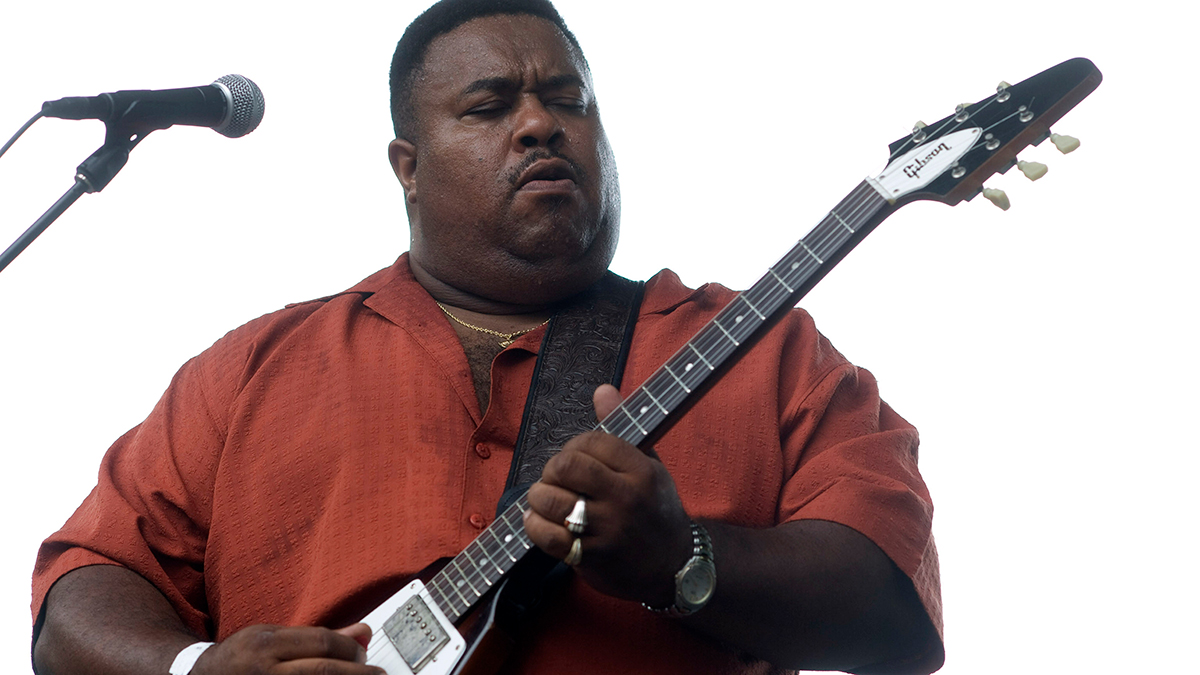Interview: Guitarists Nathan Hussey and Mel Washington of All Get Out Discuss the Wildlife Tour and Being Favorite Gentlemen

Charleston, South Carolina, indie rockers All Get Out have two Favorite Gentlemen releases to their credit, including a self-titled EP from 2008 and a full-length, The Season, which was released last September.
The band -- Nathan Hussey (vocals/guitar), Mel Washington (guitar/vocals), Mike Rogers (bass/vocals) and Gordon Keiter (drums) -- are about to set out on a six-week US tour with La Dispute, beginning Saturday, March 24.
Guitarists Hussey and Washington found some time during their drive along the East Coast to chat with Guitar World about the tour, their writing process, Favorite Gentlemen Records and the band's future plans.
GUITAR WORLD: You guys consider yourselves to be a “loud” band, and fans could say the same. How does it feel to support bands on the road that are arguably heavier and darker than you?
NATHAN HUSSEY: It’s fun. We’ve done tours with a lot of softer bands like Lydia — obviously a lot more swooning going on. So for those tours we kind of throw it back a little bit. When we get these heavier bands, it brings out a more fun side of us and we care a lot less about the dynamics of things. We just kind of walk on stage and try to rage as much as we can. It’s a little therapeutic, actually. I grew up listening to heavier bands, so it feels good and brings out a different side of us with a lot more energy. The room’s different — the fans are louder, and you can get away with a lot more stuff and have a lot more fun.
How has being signed to Favorite Gentlemen influenced the music you guys write?
MEL WASHINGTON: I don’t know that the label itself has influenced our songs. We’re really close to some of the bands on the label — O’ Brother, Manchester Orchestra, Kevin Devine, Junior Astronomers — those are all really good friends of ours, so if anything, it’s not so much of a musical thing but more of the stories that come from our interactions with them. There isn’t an “If you’re on the label, then you’re going for a certain sound” aspect, and that’s what’s really cool. The label has given us the liberty to be who we are and make the records that we want to make. So that’s been a huge blessing.
All the latest guitar news, interviews, lessons, reviews, deals and more, direct to your inbox!
Can you describe your writing process, especially for The Season?
WASHINGTON: For most of the songs, Nate will write the verses and choruses and bring them to the table. For The Season, we had three different sessions where we went in and dissected about five songs at a time. We ripped them apart and built them back up and recorded demos of them. We took those to the studio to do pre-production, and they even changed there! In our writing sessions, we would write parts and get what we thought was a complete song, and when it was time to take it to pre-production it got torn apart again by our producer. He would pick apart our songs and make them listenable. In the end, we got a product that we were super proud of.
You guys recorded The Season with producer Matt Malpass. In turn, it made for an album that was a bit more on the pop side. In what direction do you find yourselves heading these days after having time to reflect on the album?
HUSSEY: Honestly, right now I’m working on an EP, but I’m not sure what to release it under. The writing comes out a little rawer — I don’t like that word — less production, a little more mess-ups, if you will. Live, we’ll always be a harder band. The pop stuff, it’s still there, but it’s harder — a lot more yelling than singing. It’s just fun. We’re not a party band, by any means, but it’s just more of that. The next record will probably be a little less produced than that one was, but that’s just kind of how it turned out. It was Malpass’ brain mixed with ours, and it was kind unusual for him to do a band like us. But it worked. It’s like we did a record to please the fans that were there for us for a couple of years, just waiting on a record.
How would you say your creative process differs between being on the road and in the studio?
WASHINGTON: I think that they differ in the same way that they are the same. For me and my involvement in the band, the creative process is all experimentation, especially on the road. It’s the same as in the studio. If we’re writing or recording, we’ll try something and see if it works. If it doesn’t, then we don’t do it. Obviously, there are some confinements to that when we’re on stage — you can’t venture out too far. We still do it here and there. Not much of it is talked through on the road, but some of it is.
For those who plan on coming out to the Wildlife Tour, what do you have planned in terms of your set?
HUSSEY: I’m debating that. We have one song that’s called “Don’t Let Me Go,” which is as old as the band is, but it’s kind of a crowd favorite of ours. It gets extremely quiet at first with just myself, and then it gets as loud as it can go. I don’t know if I want to do that one for the tour, but I don’t want to lose the La Dispute fans, because I hear they’re quite rowdy [laughs]. I’m thinking six of our heaviest songs — maybe one from the previous EP. We are going to try to just pump them out as quickly as we can with no breaks. “Me and My Lovers,” “The Season,” “Subject to Change,” “Come My Way,” maybe “Don’t Let Me Go,” and one other — I don’t know what else I’ll do.
Who have been some of your influences on guitar and songwriting?
HUSSEY: One of my all time favorite bands is Pedro the Lion. That stuff is just brilliant. It doesn’t reflect as much in my material unless you pick it apart—you can kind of hear a little bit. Obviously The Beatles and stuff like that, but even Brand New — Sainthood Reps is on this tour with us, and one of their guitarists plays with them as well. I’m a big Every Time I Die fan [laughs]. I love it. Keith Buckley kills it. It’s amazing. I think that might do it for now.
WASHINGTON: Early on, when we started the band, one of my idols in terms of playing guitar in rock bands was David Owen, who was the guitar player for Lovedrug. I’m not one of those guitar players that looks up to people — I respect them — in terms of Joe Satriani and such, but it’s never a goal of mine to play like them. Guitar wasn’t my first instrument. I started playing drums and moved on to teach myself other instruments, so it wasn’t like I wanted to be a shredder of a guitar player as a child. And I’m not. At all. All I wanted to be was a guitar player that had taste and played tasteful parts that accentuated the mood of the song. I’ve always felt like David Owen was good at that. He no longer plays in Lovedrug, but I still feel that he is somewhat of a veteran. I still listen to their album, Pretend You’re Alive, because I feel that it’s one of the best records put out in the last 20 years. He is probably my biggest influence in terms of guitar playing in All Get Out.
What kind of guitar gear do you use on the road?
HUSSEY: I use what typical indie rockers in skinny jeans use [laughs]. I play a Telecaster. I think Telecasters are just the most amazing guitars. They’re versatile — you can use them for anything and just throw them across the stage, pick them up and keep playing. I’m an all-Fender guy. I have a little Fender Tweed Blues Deville that I love. Actually, Guitar World just did something on one of the pedals that I use. It’s called the Wave Cannon by Caroline Guitar Company — brilliant fuzz pedal. I believe you guys had it as one of your top fucking pedals. Our bassist actually builds for the company, so that’s really cool. He’ll build them for us and mod them out. He has that job when he’s off tour.
WASHINGTON: Mostly Fender amps. For the last few tours, I’ve been playing out of a Fender Twin amp. I play Teles live. I’ve got a chain of pedals — a Holy Grail reverb, a Holy Grail Plus reverb, a Boss Digital Delay, a Little Big Muff, a Fat Boost made by Fulltone and a pickup booster made by Seymour Duncan.
It seems touring really has set the bar for you guys as a band as well as a family. Does life on the road ever get to a point when it just feels stagnant, or is it always a growing process for you?
HUSSEY: It’s not all growing. I think it gets overplayed a little bit. Some people just want a story so they say that and get the sympathy card [laughs]. It’s fun. In some ways, it’s a vacation, and in other ways it’s a full-time job. This tour is a hell of a long tour. It’s a full US tour — six weeks, 38 shows, and we get one day off a week — and on those days off we’re driving. You miss home. I’m married, and this will be the longest tour I’ve had since getting married. That’s kind of a bitch, but now we’re in a little bit better of a place.
When we first started out we did 250 shows a year for two years in a row. That’s how we got our name out. We lived off a couple dollars a day apiece, and a lot of people helped us out. That was a little more grueling, but we’re not making a living off of it. We’re trying, and it’s a little more comfortable now. The further along you get, the more work is required. It is a good time, and it’s just as much work as it is fun. It’s a weird balance. I think for this tour, my wife is going to fly out and hang on some of the West Coast dates with us, and then I’ll get to see her back on the East Coast. She’s a trooper. She hangs. We’ve had our moments, but she’s fully supportive. It’s awesome.
Keep up with All Get Out at their official Facebook page.
